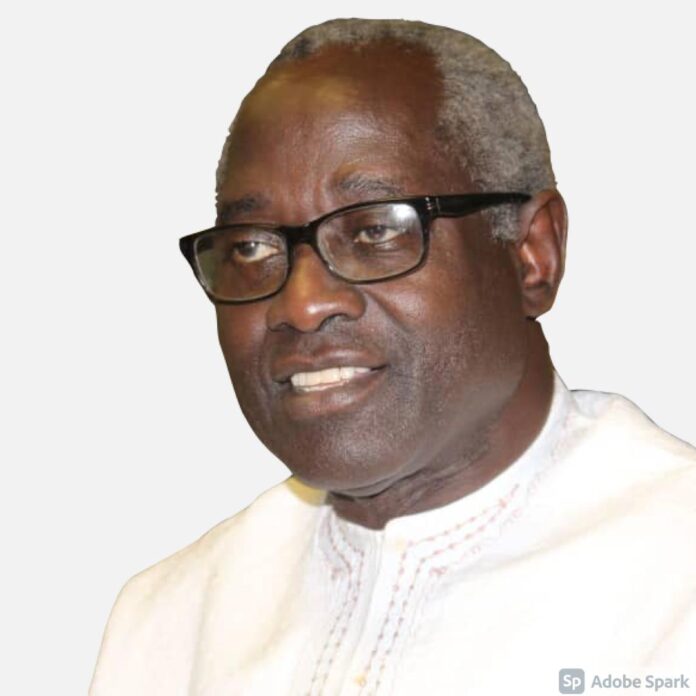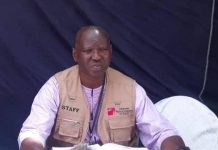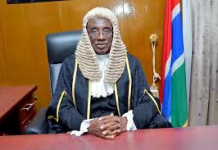By Demba Bah.
The People’s Democratic Organisation for Independence and Socialism (PDOIS) on Sunday, 11 June held a press conference discussing the state of the nation and the way forward for the Gambia. The press conference was done by Halifa, the party’s Secretary-General and it was held at the party’s headquarters, Churchill Town, Kanifing Municipality.
Halifa Sallah, a former lawmaker, started his deliberations by clearing misconceptions about what his party stands for. He said such misconceptions coming from analysts are designed to put the people to sleep. He added that such delusion must be tackled.
“I must begin by emphasising that every Gambian is clear of what PDOIS is ready to do for this country,” he said.
He stated that there are some people who claim that the PDOIS’ ideology is not clear. Halifa gave a practical interpretation of P.D.O.I.S. initials by showing concretely how each is connected to the realities of the country.
Why PEOPLE’S DEMOCRACY’?
He said, “we are opposed to a democracy where patronage determines how people vote. That is democracy based on patronage – of buying a human being to be able to win elections. We are opposed to that“. He went on to elaborate further by saying The Gambia is a republic where the people own themselves and the country. He added that they are not slaves to anybody as they own power.
He said: “That is where we are opposed to politics of patronage, democracy based on patronage where you tell somebody if you do not vote for me, I will not bring about development because I am in power. That is coercion and coercion is tyranny. It is imposing your will on people. We are opposed to the imposition of the will of any Gambian on other Gambians.
We stand for People’s Democracy. People who are free from intimidation, inducement, who are clear that they are entrusting their power to people to promote their welfare. Halifa asserted with emphasis that, ‘that is the language of the Constitution. It is the language of truth. It is the language of the republic and that is why we broke away from the chains of colonialism in order to take charge of our destiny. That is why PDOIS stands for citizenship education.”
In response to the people who say PDOIS will be here for centuries educating the people, Sallah insisted that educating the people is their mission because the role of political parties is clearly defined under section 60 of the Constitution – which is to participate in shaping the political will of the Gambian people.
Sallah maintained that that is how the politics of the republic should be.
“That is what PDOIS has been doing. So we have fulfilled our mandate. What the people do is another matter but what we should do we know and have been doing,” he said.
He stated that PDOIS believes in People’s Democracy and he asked the question who is opposed to that in the country.
He called on PDOIS members to refuse the invitation by critics that they cannot come to power without doing as they do – which is politics of patronage. He said politics of patronage is an enemy of the people and called on people to combat it. He added that PDOIS activists should take the lead in combating politics of patronage and deception because those doing it want to keep the people in the dark/sleeping.
INDEPENDENCE:
Sallah said: “Your country is a heavily indebted and a poor country. That is how it is labelled – the least developed country. PDOIS is not proud of that label.”
He pointed out that the economy is import oriented instead of being export oriented through investing in the productive base. He gave the statistical figures on trade imbalance in 2022 which is in the deficit as follows: “We imported 44.9 billion dalasi worth of goods, exported only 1.2 billion and re-export another 1.7 billion, giving a deficit of 41.9 billion.”
Halifa said the country is dependent because it cannot feed itself and that is why prices of goods will skyrocket as we continue to wallow in poverty. He said PDOIS has been advocating for a self-reliant economy to be built for import substitution where instead of importing rice worth 2 billion annually, we produce it. So the aim, he said, is to feed ourselves and insist, there is no Gambian who is opposed to that.
SOCIALISM:
In order to eradicate poverty, PDOIS is adamant the country must have a productive base. He said, in economic terms, “we must have production. We must have accumulation. We must have distribution.” He said an individual can produce, accumulate but, will they distribute it to society. Of course not. That is not the role of an individual.
“PDOIS is saying we have people who are given authority under the Constitution to raise funds on our behalf. They can even tax us. These funds can be invested in the productive base and have public enterprises that pay dividends to us. Revenue could be raised through public enterprises in public investment. It is those people who have the responsibility to engage in a type of production, a type of accumulation that would ensure the distribution comes to us so that we can be free from poverty. That is what socialism is,” Halifa explained.
He added: “Public resources invested in the productive base will raise public revenue in order to provide public services. That is what PDOIS is saying. That is what sovereign national wealth is all about. If PDOIS were to be in charge of this country, from the village level, we would ensure that the revenue stays there for their development. That alone is not enough, so before a village enters into an agreement with a foreign company to grow bananas, the inhabitants will receive funds from the Central Bank, a fund established for that purpose to be able to produce the banana plantation themselves and the wealth ploughed back for village development. What makes that impossible?”
He said that is socialism. In the areas being mined, such as Batakunku, Sayang and Kartong, Halifa said there has to be a contract where the Central, local government and village will gain to ensure development.
“We are saying there must be a balance and proportionate development of society. How? Through sovereign national wealth,” he said.
AGENDA 2016
“As we move to a new electoral cycle, it is important for us to look back where we are today and how we got here. We were here in 2016. We all agreed that the ground was not level for multi-party elections. We were facing elections. We looked at the situation and had to develop a tactic. And PDOIS obviously, prior to all this had an Agenda 2016. There were six presidential candidates and if we all stood, the president would exploit the power of incumbency to win. So the objective in Coalition 2016 was to eradicate the power of incumbency. When we succeeded in taking over the country, some parties felt that they were already having the advantage over other parties in the electoral scene even if the advantage would have never led them to take over power. So the feeling was well, this is now an opportunity. Opportunity for what? To enjoy the power of incumbency. So therefore, the thinking was that the person who should have served for three years would now serve for five years. At least exhaust his term and hand over the power of incumbency to somebody else. That was the objective.”
He said in the council election, out of 962,157 registered voters nationally, only 394,468 voted and the rest did not participate. He added 458,348 participated in the Mayoral and Chairperson elections while over 479,000 did not participate. He said the reason for the low voter turnoeshould be interrogated and there should be a way forward to address it.
Sallah told the press that the objective of the 2016 elections was meant to put an end to the power of incumbency. Halifa explained that the objective of Coalition 2016 was to eradicate the power of incumbency.
“To create a level ground for multi-party contest and ensure that the Gambian people will no longer suffer from patronage or intimidation but will own themselves to determine who should manage their affairs,” he said.
He explained that the agreement was for a 3-year transitional government having an all-inclusive government at the level of the executive, legislature and local government. He said the transitional government was supposed to institute constitutional and institutional reforms. He added that no party would have the advantage of incumbency, but after the change of government some of the parties felt that they had the upper hand. Sallah explained that they failed to realise that their supposed power could not change the regime.
Sallah said PDOIS went to elections in 2021 knowing that there was no level ground for multi-party contest. He added that the power of incumbency manifested itself in the 2021 elections.
He said: “Our anticipation was that, 2016 had broken the chains and the people will take charge of their destiny. They cannot be pressurized or intimidated to vote for anyone. They had full power and authority to decide what would happy. So we thought the people hearing what PDOIS intends to do, comparing it with what others intend to do, will give us the advantage. Ultimately, over 457,519 registered voters voted for the incumbent.”
“In a country where the vast majority of the people are yet to gain awareness of their sovereignty, the power of incumbency is invincible. That is why Jawara was here for thirty years and Jammeh for twenty-two years,” he said.
He stated that unless the lesson of 2016 is daily communicated to the people by all who want them to be liberated, the power of incumbency will remain. He said NPP is now in control of the National Assembly and has more Councils under its gripped than the popular vote reflects.
“Where do we go from here?” he quizzed.
He said the objective was to cure a disease but some felt it is just academic.
“If so, let it continue and not complain,” he stressed, adding “You must care and be concerned about the disease – not just election for election sake. That is what PDOIS is concerned about and intends to address.”
In order to do that, he said PDOIS must look inward to build its foundation having its members claiming all the ideas and take ownership of them so that in every village you will find PDOIS members with very clear ideas on how that can address the needs and aspirations of our people for liberty and prosperity.
“We must begin that work of raising awareness to combat that disease. And that disease has power. The power of patronage – the power of coercion,” he said.
He added: “Those who have won elections based on the system that exists, let us not deprive them but counsel them to accept this system is not fit for a republic so that we will all join hands to create a better system that will enable our people to be truly in charge so that we can compete fairly as owners of this country, as citizens who treasure each other, who would be happy to see anybody in office as long as we have free and fair elections. We congratulate each other based on that not patronage.”
He reminded those in power to recognize this and be ready to work on and carry institutional reforms so that the country moves towards a type of system that is ethics-based, rule-based, and knowledge-based.
“If we do, our country will be respected internationally and will get anything we want for ourselves, by ourselves, and from the world. That is the future PDOIS anticipates and is ready to work for in the next electoral cycle. It is the beginning of another beginning. If embraced, we will have a new state where you will not hear insults, intimidation, or derogatory remarks in politics. There will be decency. We will begin to treasure each other and engage in the national conversation. The beginning of that conversation is here. Let us embrace it and continue with it during the next electoral cycle and we will deliver the new Gambia,” he concluded.




















